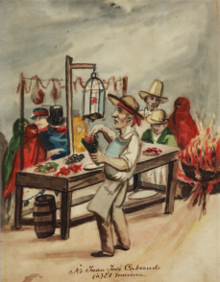Juan José Cabezudo
Juan José Cabezudo | |
|---|---|
 Photograph by Eugenio Courret | |
| Died | 1860 Chorrillos, Peru |
| Occupation | Chef |
Juan José Cabezudo, also known as "El maricón" or "Comesuelas" (b. c. 1800, d. c. 1860) was a famous Afro-Peruvian cook with a food stall in Lima's Plaza Mayor, during the first half of the 19th century. Travelers, such as Max Radiguet, writers, such as Ricardo Palma, costumbrista painters, such as Pancho Fierro and Francisco Javier Cortés, and the photographic studio of Eugenio Courret portrayed Juan José. His name became synonymous with "faggot" in the Peruvian political press of the 19th century, which speaks of the enormous visibility of this character, who is recognized in history as the first openly homosexual Peruvian figure.[1][2]
Biography

Whilst little is known about Cabezudo's early life, he is recorded as being of African descent. However, more detail has been recorded about his career and personality.[3] Cabezudo was a chef, who had a street-food stall in the Escribanos portal, a place very close to the Plaza Mayor in Lima, where he served typical Peruvian dishes, including tamales.[3][4] He also had a food stall at the exit of the Acho bullring.[4] When Simón Bolívar left Peru, Cabezudo was commissioned to cook the farewell dinner.[3]
Cabezudo's food stalls were widely known in Lima at the time, and he was commercially successful.[3] Nevertheless, he gambled much of his earnings in games of chance at the Chorrillos spa.[5] His homosexuality was also discussed by writers and journalists during his life. According to historian Magally Alegre, Lima in the 19th century was a city where gay men could lead comparatively open lives.[3]
According to historian Ricardo Palma, he died in Chorrillos in 1860, destitute.[6]
Historiography

Cabezudo's life was first recorded by Peruvian historian Ricardo Palma, who wrote a short biography about his fame, his homosexuality and his transvestism.[7][8] The travel writer Max Radiguet mentions his life.[3] He was also depicted in a series of watercolours by Francisco Fierro,[6] as well as Francisco Javier Cortés, and was photographed by Eugenio Courret.[3]
References
- ^ Alegre Henderson, Magally (1 May 2012). "Androginopolis: Dissident Masculinities and the Creation of Republican Peru (Lima, 1790-1850)".
{{cite journal}}: Cite journal requires|journal=(help) - ^ Majluf, Natalia (2016). La creación del costumbrismo: las acuarelas de la donación Juan Carlos Verme [exposición, Lima, Museo de Arte de Lima, 12 de julio de 2016 al 12 de marzo de 2017]. Travaux de l'Institut français d'études andines (Primera edición ed.). Lima: MALI, Museo de Arte de Lima IFEA, Instituto Francés de Estudios Andinos. ISBN 978-9972-718-54-0.
- ^ a b c d e f g "El cocinero más famoso de la independencia: Juan José Cabezudo | Buenazo.pe". buenazo.pe (in Spanish). Archived from the original on 31 July 2022. Retrieved 31 July 2022.
- ^ a b "Juan José Cabezudo: afroperuano, cocinero y travesti en la Lima del s. XIX | Blog de Aldo Panfichi – Política, Sociedad, Fútbol" (in European Spanish). Archived from the original on 8 May 2021. Retrieved 24 June 2022.
- ^ "Juan José "el maricón" era el cocinero más renombrado de Lima hasta el siglo XIX". Suspiro de Limeña (in Spanish). 20 September 2016. Archived from the original on 12 May 2021. Retrieved 24 June 2022.
- ^ a b Campuzano, Giuseppe (2008). Museo Travesti del Perú (in Spanish). Museo Travesti del Perú. pp. 56–57. ISBN 978-9972-33-588-4. Archived from the original on 31 July 2022. Retrieved 24 June 2022.
- ^ Escudero, Wilfredo Kapsoli (2014). "Apostillas de Ricardo Palma a las acuarelas de Pancho Fierro". Aula Palma (in Spanish) (13): 233–266. doi:10.31381/test2.v0i13.135. ISSN 2415-2218. Archived from the original on 24 June 2022. Retrieved 24 June 2022.
- ^ Pamo Reyna, Oscar G. (25 January 2016). "Transvestism in Lima: from the Colony to the Republic". Acta Herediana. 56: 31. doi:10.20453/ah.v56i0.2713. ISSN 2411-4502. Archived from the original on 31 July 2022. Retrieved 7 May 2021.
External links
 Media related to Juan José Cabezudo at Wikimedia Commons
Media related to Juan José Cabezudo at Wikimedia Commons- Ño Juan José Cabezudo El maricón
